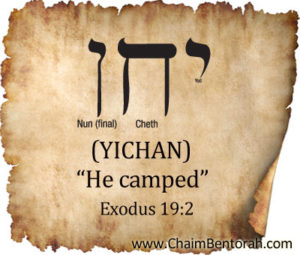Hebrew Word Study – Camped – Chanah – Cheth nun Hei
Exodus 19:2 “For they were departed from Rephidim, and were come [to] the desert of Sinai, and they camped in the wilderness, and there Israel camped before the mount.”
 I was reading in Exodus this morning in my Hebrew Bible and ran across something very interesting. I really had to go to Jewish literature to find an answer. The word camped chanah is found two times in Exodus 19:2. The first time it is in the form of yachanu which is the plural for – they camped. The second time it is found in the form of yichan which is singular Israel he camped. Like English when Hebrew uses a collective word such as Americans, army, Chicago Bears etc. it is followed by a plural pronoun “Then the Americans (they) came.” In English, we do not use the pronoun if the noun is used so the grammatical error is not really noticed unless you read it in the Hebrew. The Hebrew word used the second time in the study verse is yichan which is clearly singular and appears to be a grammatical error.
I was reading in Exodus this morning in my Hebrew Bible and ran across something very interesting. I really had to go to Jewish literature to find an answer. The word camped chanah is found two times in Exodus 19:2. The first time it is in the form of yachanu which is the plural for – they camped. The second time it is found in the form of yichan which is singular Israel he camped. Like English when Hebrew uses a collective word such as Americans, army, Chicago Bears etc. it is followed by a plural pronoun “Then the Americans (they) came.” In English, we do not use the pronoun if the noun is used so the grammatical error is not really noticed unless you read it in the Hebrew. The Hebrew word used the second time in the study verse is yichan which is clearly singular and appears to be a grammatical error.
So is this grammatical error or anomaly just a mistake? If so that would put our belief in the inerrancy of Scripture in question. There are Christians, even evangelicals who believe the Bible is inspired but not inerrant, in other words, there are grammatical errors in the Bible but it is still inspired. I am of the old school that the Bible is both inspired and inerrant. This is also the belief of the orthodox Jews. Another theory is that the grammar in Hebrew is filled with many exceptions. This is my belief. I used to joke to my first-year Hebrew students that in the first semester of Hebrew they would learn all the rules of grammar and in the second semester they would learn all the exceptions to the rules. However, I recently ran across a young Jewish scholar who studied dikduk which is a deep study of Hebrew grammar examining the narrow distinctions between verb formations and subtle differences in tense structures. He would not let this little grammatical anomaly slide. Neither would the Jewish sages for that matter.
Would you like Chaim Bentorah as your personal Hebrew teacher?
|
|
So that leaves us with a third alternative which is a variation on the exception to the rule theory and that is if there is an exception to the rules of grammar there may not only be a grammatical reason for that exception but it may also be just God’s intention to convey a remez – a hint that there is a deeper message embedded in the passage.
In searching through Jewish literature I found their answer lies in this third theory and that is this grammatical anomaly was that God intended to convey a deeper message. Rashi, the medieval French Jewish commentator on the Torah and the Talmud pointed out that in all the other uses of chanah, encampments the plural yachanu is used, they camped. That is because the Jews were in argument and dissent, but when they encamped to receive the laws of God the singular yichan was used to show they were all of one heart and mind.
Therein lies an important message for the church today. When the church is in argument and dissent God cannot give His clear message and instructions. But if the church is of one heart and mind God will reveal his heart and mind to that body.
Hi there! Thank you for reading this Daily Word Study. Can I ask a favor? Share this Daily Word Study with your friends on Facebook and Twitter by clicking one of the icons below.
Thanks & Blessings, it means a lot to me!







Ahhh that makes sense now. I knew there was something more. Thank you for sharing.
Accidentally bumped ‘enter’ before email included email,.don’t believe my comment went through. will repeat.
As always, our English translation Bible is sadly lacking and we are left casually reading ‘camped’ and ‘camped’ and move on to the next verse.
The ‘remez’ explanation and application there was insightful, especially after struggling at university level with all the exceptions to every rule. In fact the ‘remez’ concept alone deserves more thought…. thanks, Chaim.
🙏🙏🙏God’s will be done!🙂
I love this explanation on the variation in usage of the Hebrew words for encampment when used as singularly and plurarly.This reminds of the community of the believers comprising the apostles and disciples how they gathered as a monolithic and corporate body .Acts says they gathered in one accord..
His divine blessings your lot sir.